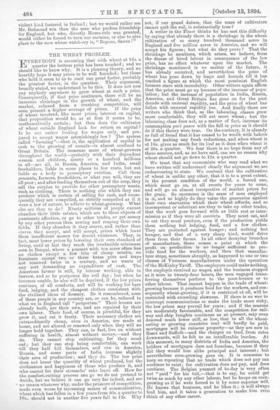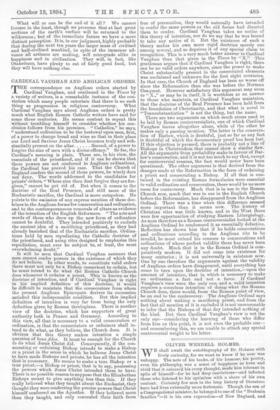THE WHEAT PROBLEM.
EVERYBODY is assuming that with wheat at 16s. a quarter the bottom price has been touched ; and we should like to know why. It is a pleasing theory, and we heartily hope it may prove to be well founded ; but those who hold it seem to us to omit one great factor, probably the greatest factor, in the question. Their argument, broadly stated, we understand to be this. It does not now pay anybody anywhere to grow wheat at such a price. Consequently, if that price continues, there will be an immense shrinkage in the growth of wheat, and the market, relieved from a crushing competition, will soon present a higher average of prices. If the price of wheat involved, like most prices, interest on capital, that proposition would be, as at first it seems to be, mathematically certain ; but then does the cultivator of wheat outside England look for return on capital ? Is he not rather looking for wages only, and pre- pared to accept wages astonishingly low ? The system called " farming "—that is, the application of capital in cash to the growing of cereals—is almost confined to Great Britain. The immense mass of wheat-growers throughout the world—probably with their dependent women and children, ninety or a hundred millions in all—are all, in Russia, America, and India, small freeholders, liable in some places to low rents, but not liable as a body to peremptory eviction. Call them peasants, farmers, freeholders, or what you will, they are all poor ; and after feeding themselves out of the crop, they sell the surplus to provide for other peremptory wants, such as clothing. There is nothing else which they can produce which is certain of selling for cash, and conse- quently they are compelled, as strictly compelled as if it were a law of nature, to adhere to wheat-growing. What -else are they to do ? Ninety millions of people cannot abandon their little estates, which are to them objects of passionate affection, or go to other trades, or get money by any other process than sowing and reaping their own fields. If they abandon it they starve, and rather than starve they accept, and will accept, prices which leave them insufficient money for decent existence. They, in fact, meet lower prices by lowering their own standard of living, until at last they reach the irreducible minimum seen in Bengal, where a peasant with ten acres often has no clothes except a few bits of cheap muslin, no furniture except two or three brass pots and trays not renewed twice in a century, and no wants of any sort demanding an expenditure of cash. The American farmer is still, by intense working, able to .borrow, and so he postpones the evil day ; but when he -becomes unable, he also will be deprived, if the low prices continue, of all comforts, and will be working for bare food, lodging, and the cheapest clothes consistent viitla the civilised ideas of decency. Be it remembered, none ,of these people in any country are, or can be, reduced to what we in England call "pauperism." Their houses are .already built, are their own, and are repaired by their -own labour. Their food, of course, is plentiful, for they grow it, and eat it freely. Their necessary clothes are extraordinarily cheap, even in America, are made at home, and are altered or renewed only when they will no longer hold together. They can, in fact, live on without suffering in health, almost without money,—and they do. They cannot stop cultivating, for they must -eat ; but they can stop being comfortable, can work -till they half kill themselves, and can in America, 'Russia, and some parts of India increase slightly their area of production ; and they do. The low price does not lower the quantity of wheat produced, but the civilisation and happiness of those who produce it, and who cannot for their stomachs' sake leave off. How far the comfort-cutting process can go we do not pretend to decide, but we believe it can go very far indeed, and see • no reason whatever why, under the pressure of competition, made even worse by increasing means of communication, wheat which has fallen in a few years from 40s, a quarter to 16s., should not in another five years fall to 12s. Why not, if our grand datum, that the mass of cultivators cannot quit the soil, is substantially true ? A writer in the Times thinks he has met this difficulty by saying that already there is a shrinkage in the wheat cultivation of so many hundred thousand acres in England and five million acres in America, and we will accept his figures ; but what do they prove ? That the shrinkage he mentions, which arises, we believe, from the disuse of hired labour in consequence of the low price, has no effect whatever upon the market. The shrinkage mentioned is no matter of the future, it has already occurred, and nevertheless the price of wheat has gone down by leaps and bounds till it has reached a figure at which the most pessimist English farmers stare with incredulity. Other writers again affirm that the price must go up because of the increase of popu- lation ; but the increase of population in India, Russia, America, and Great Britain has gone on for the past decade with unusual rapidity, and the price of wheat has fallen with unusual rapidity too. And finally there are writers who think that, as the labouring classes grow more comfortable, they will eat more wheat ; but the labouring class does not, as a matter of fact, increase its consumption pari passu with the fall in price as it should do if this theory were true. On the contrary, it is already so full of bread that it has ceased to be wroth with bakers for not making any fresh reductions, and when wheat is at 16s. gives as much for its loaf as it does when wheat is at 26s. a quarter. We fear there is no hope from any of these sources, and, as we have said, can see no reason why wheat should not go down to 12s. a quarter.
We trust that any economists who may read what we have written will understand clearly the argument we are endeavouring to state. We contend that the cultivation of wheat is unlike any other, that it is to a great extent, in the present condition of the world, a forced one, which must go on, at all events for years to come, and will go on almost irrespective of market prices for the grain. So enormous is the mass of men employed in it, and so highly do they value the guarantee against their own starvation which their wheat affords, and so incompetent or reluctant are they to take up other trades, that the work goes forward with as little rest or inter- mission as if they were all convicts. They must eat, and to eat they must produce, even if the production yields them nothing but lodging, food, and a few clothes. They are protected against hunger; and nothing but hunger, and that of a very sharp kind, would drive them from their farms. In all other decaying branches of manufacture, there comes a point at which the profit on production is no longer sufficient to pro- vide food for the workers, and then that manufac- ture stops, sometimes abruptly, as happened to one or two classes of Viennese manufacturers under the operation of the McKinley Tariff. The employers could make nothing, the employs received no wages, and the business stopped as it were in twenty-four hours, the men engaged trans- ferring themselves perforce to the poor-houses or to other labour. That cannot happen in the trade of wheat- growing because it produces food for the workers, and con- sequently wheat-growing, if it is restricted at all, will be restricted with exceeding slowness. If there is no war to interrupt communications or make the trade more risky, the low prices may prevail for years ; and if the seasons are moderately favourable, and the competition for rail- way and ship freights continues as at present, may even descend much lower still, so low, that in all the wheat- eating or growing countries rent will hardly be paid, mortgages will be ruinous property—as they are now in Essex and Suffolk—and the charges on land, from rates downwards, will be felt as an insufferable burden. At this moment, in many districts of India and America, the holders of mortgages dare not foreclose, because if they did they would lose alike principal and interest ; but nevertheless corn-growing goes on. It is nonsense to keep on repeating that no trade which does not pay can continue to exist ; for cult ivation does not pay, and does continue. The Belgian peasant of to-day is very often not " paid " for his toil,—that is to say, he could get twice as much by any other labour, but he keeps on corn- growing as if he were forced to it by some superior will. He knows that business, and he likes it ; it will always feed him, and it takes a generation to make him even think of any other career. What will or can be the end of it all P We cannot foresee in the least, though we presume that at last great sections of the earth's surface will be returned to the wilderness ; but of the immediate future we have a more distinct perception. It is, in our judgment, highly probable that during the next ten years the larger mass of civilised and half-civilised mankind, in spite of the immense ad- vance all artisans are making, will retrograde alike in happiness and in civilisation. They will, in fact, like Otaheitans, have plenty to eat of fairly good food, but they will have nothing else.



















































 Previous page
Previous page